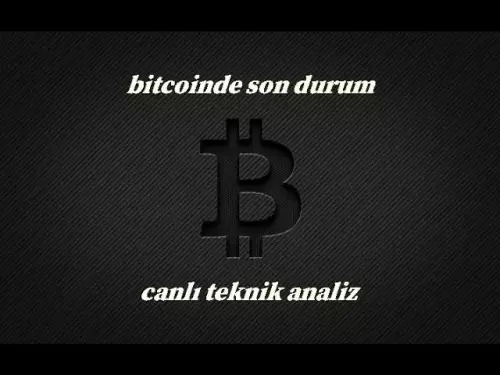-
 Bitcoin
Bitcoin $117,272.7457
1.45% -
 Ethereum
Ethereum $2,938.4907
0.32% -
 XRP
XRP $2.7050
7.14% -
 Tether USDt
Tether USDt $1.0003
0.03% -
 BNB
BNB $688.4019
0.08% -
 Solana
Solana $162.0506
-0.53% -
 USDC
USDC $0.9999
0.01% -
 Dogecoin
Dogecoin $0.1981
2.75% -
 TRON
TRON $0.3014
2.68% -
 Cardano
Cardano $0.7006
4.22% -
 Hyperliquid
Hyperliquid $45.7987
5.26% -
 Sui
Sui $3.3641
-1.74% -
 Stellar
Stellar $0.3530
17.81% -
 Bitcoin Cash
Bitcoin Cash $526.1849
1.91% -
 Chainlink
Chainlink $15.0782
-0.24% -
 Avalanche
Avalanche $20.4108
-1.04% -
 UNUS SED LEO
UNUS SED LEO $9.0974
0.64% -
 Hedera
Hedera $0.1908
0.86% -
 Shiba Inu
Shiba Inu $0.0...01307
-0.71% -
 Toncoin
Toncoin $2.9472
0.65% -
 Litecoin
Litecoin $93.4465
-0.72% -
 Polkadot
Polkadot $3.8633
0.76% -
 Monero
Monero $331.7195
1.21% -
 Uniswap
Uniswap $8.6299
3.44% -
 Dai
Dai $0.9997
-0.01% -
 Ethena USDe
Ethena USDe $1.0005
0.00% -
 Bitget Token
Bitget Token $4.5000
-1.64% -
 Pepe
Pepe $0.0...01213
-0.55% -
 Aave
Aave $293.9403
-3.56% -
 Bittensor
Bittensor $388.7816
4.71%
What is a crypto options contract?
Crypto options allow traders to speculate on cryptocurrency price movements without owning the asset, offering strategic flexibility through call and put contracts.
Jul 11, 2025 at 07:15 am
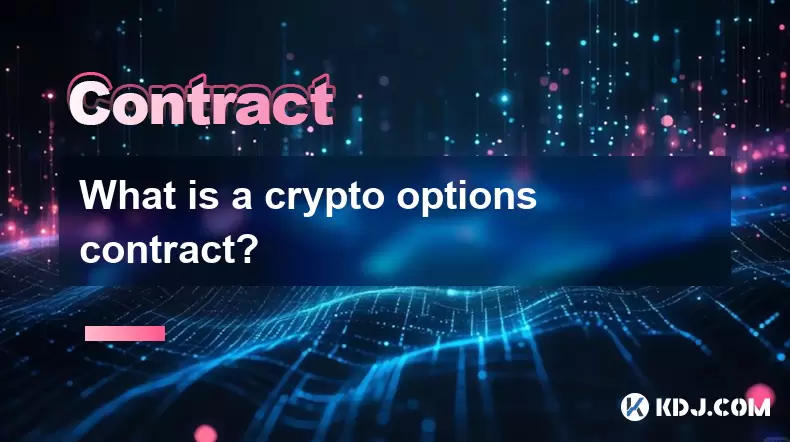
Understanding the Basics of Crypto Options Contracts
A crypto options contract is a financial derivative that allows traders to speculate on or hedge against the future price movements of cryptocurrencies without actually owning the underlying asset. These contracts give the buyer the right, but not the obligation, to buy or sell a specific cryptocurrency at a predetermined price (known as the strike price) on or before a specified expiration date.
In traditional finance, options have long been used for stocks and commodities. However, with the rise of digital assets like Bitcoin and Ethereum, options trading has expanded into the crypto market, offering new tools for risk management and profit strategies.
The key distinction lies in the fact that options provide flexibility—holders are not forced to execute the trade if it becomes unfavorable.
Types of Crypto Options: Calls and Puts
There are two primary types of options in the crypto space: call options and put options.
- A call option gives the holder the right to purchase an asset at a set price. If the market price rises above the strike price, the call option can be exercised for profit.
- A put option, conversely, allows the holder to sell an asset at the strike price. Put options increase in value when the price of the underlying cryptocurrency drops below the strike price.
Each type serves different strategic purposes depending on whether the trader expects prices to rise or fall. Understanding these instruments helps traders craft more nuanced investment approaches.
How Crypto Options Contracts Work
When a trader buys a crypto options contract, they pay a premium to the seller (also known as the writer of the option). This premium is non-refundable and represents the cost of acquiring the right embedded in the contract.
For example:
- Suppose you buy a Bitcoin call option with a strike price of $60,000 expiring in 30 days. If BTC’s price reaches $65,000 during that period, you can exercise your right to buy BTC at $60,000 and immediately sell it at the higher market price, netting a profit after deducting the premium paid.
- If BTC stays below $60,000, you can choose not to exercise the option and only lose the premium.
Sellers of options take on the obligation to fulfill the transaction if the buyer chooses to exercise. In return, they receive the premium upfront, which can be a source of income but also exposes them to potential losses.
Key Features of Crypto Options Contracts
Several elements define a crypto options contract:
- Strike Price: The price at which the underlying cryptocurrency can be bought or sold.
- Expiration Date: The last day the option can be exercised. After this date, the contract becomes worthless.
- Premium: The cost paid by the buyer to the seller for the rights conferred by the option.
- Underlying Asset: The cryptocurrency (e.g., BTC, ETH) upon which the option is based.
These features collectively determine the value and utility of an options contract. Traders must consider each when formulating their strategy.
Volatility plays a significant role in pricing options premiums. Higher volatility typically leads to higher premiums due to increased uncertainty about future price movements.
Trading Platforms Offering Crypto Options
Crypto options are primarily traded on centralized and decentralized derivatives exchanges. Some of the major platforms include:
- Deribit: Known for its deep liquidity in Bitcoin and Ethereum options.
- OKX: Offers both European and American-style options contracts.
- Bybit and Bit.com: Also support options trading with various strike prices and expiry dates.
To begin trading:
- Register and complete KYC procedures.
- Deposit funds, usually in stablecoins or native tokens.
- Navigate to the options section and select the desired contract.
- Choose between buying calls/puts or writing (selling) them.
- Set parameters such as strike price and expiration.
- Confirm the trade and monitor the position until expiration or early exercise.
It’s crucial to understand the risks involved, especially when writing options, which can lead to unlimited liability in some cases.
Risks and Considerations in Trading Crypto Options
While crypto options contracts offer strategic advantages, they come with inherent risks:
- Time Decay: As expiration nears, the value of the option may decrease, especially if it's out-of-the-money.
- Market Volatility: Sudden price swings can make options either highly profitable or completely worthless.
- Liquidity Risk: Not all options contracts are actively traded, making it difficult to exit positions quickly.
- Counterparty Risk: Especially relevant on less reputable platforms where default risk exists.
Traders should conduct thorough research and possibly start with small positions to grasp how options behave under different market conditions.
Using demo accounts or paper trading can help familiarize users with options mechanics before committing real capital.
Frequently Asked Questions
Q1: Can I exercise a crypto options contract before expiration?
Yes, certain types of options, particularly American-style contracts, allow early exercise. However, most crypto options are European-style, meaning they can only be exercised at expiration.
Q2: What happens if I hold an out-of-the-money option at expiration?
If the option is out-of-the-money when it expires, it becomes worthless, and the buyer loses the premium paid. The seller keeps the premium as profit.
Q3: How does implied volatility affect crypto options?
Implied volatility reflects market expectations about future price fluctuations. Higher implied volatility increases options premiums because there’s a greater chance the price will move beyond the strike price.
Q4: Are crypto options taxed differently than spot trades?
Tax treatment varies by jurisdiction. In many regions, profits from options trading are treated similarly to other capital gains, but specific rules may apply. Always consult a tax professional for accurate guidance.
Disclaimer:info@kdj.com
The information provided is not trading advice. kdj.com does not assume any responsibility for any investments made based on the information provided in this article. Cryptocurrencies are highly volatile and it is highly recommended that you invest with caution after thorough research!
If you believe that the content used on this website infringes your copyright, please contact us immediately (info@kdj.com) and we will delete it promptly.
- Eddie Rocks the Royal Mint: Iron Maiden's 50th Anniversary Gets Coin-ified!
- 2025-07-12 16:30:11
- Sui Price Surge, Remittix Emerges: DeFi and Altcoin Opportunities in 2025
- 2025-07-12 17:10:12
- XLM Price Surges Amid Stellar Upgrade Buzz: Is $1 Within Reach?
- 2025-07-12 17:10:12
- PumpFun, Solana, and the Launchpad Competition: A Meme Coin Arena?
- 2025-07-12 16:50:12
- Pepe Coin Price Prediction: Pump or Dump? What's Next for the Frog Meme?
- 2025-07-12 16:30:11
- Binance, CZ, and the Trump Family: A Crypto Tango?
- 2025-07-12 17:15:12
Related knowledge
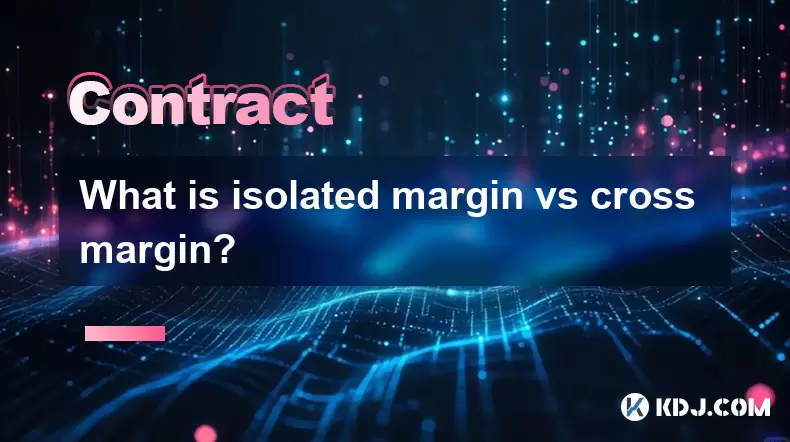
What is isolated margin vs cross margin?
Jul 12,2025 at 04:01pm
Understanding Margin in Cryptocurrency TradingIn cryptocurrency trading, margin refers to the amount of funds a trader must deposit to open and mainta...
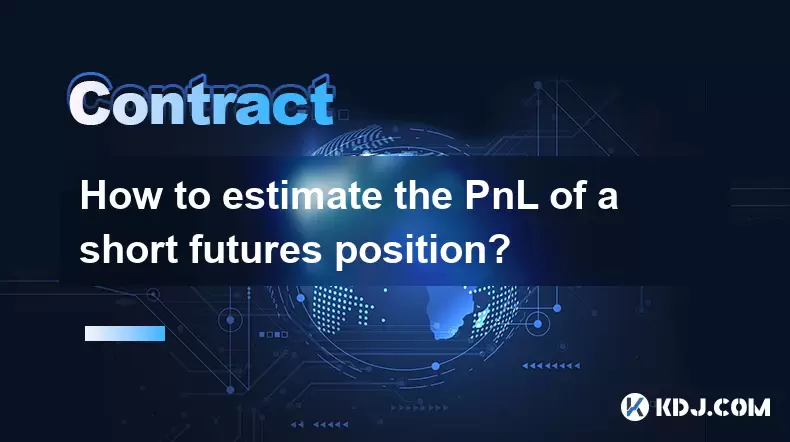
How to estimate the PnL of a short futures position?
Jul 10,2025 at 05:00pm
Understanding the Basics of Futures Trading and PnLIn futures trading, a trader enters into a contract to buy or sell an asset at a predetermined pric...
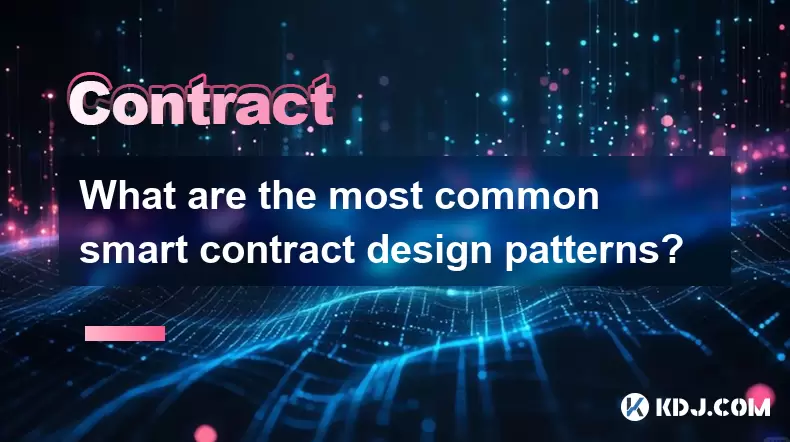
What are the most common smart contract design patterns?
Jul 10,2025 at 09:29pm
Introduction to Smart Contract Design PatternsSmart contract design patterns are standardized solutions to recurring problems encountered during the d...
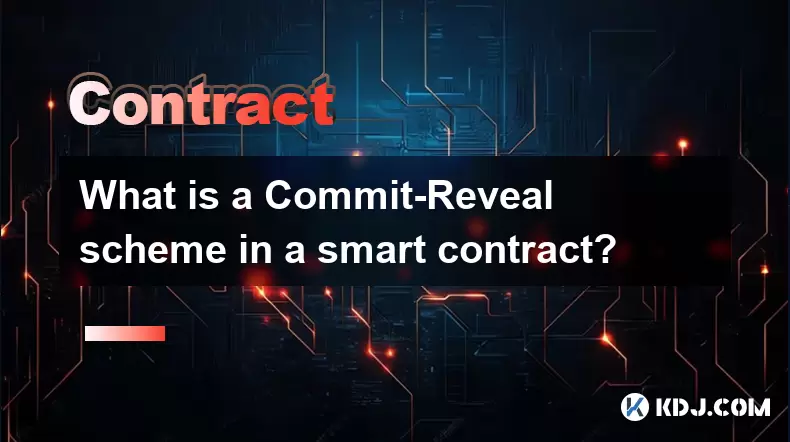
What is a Commit-Reveal scheme in a smart contract?
Jul 10,2025 at 05:22pm
Understanding the Concept of a Commit-Reveal SchemeIn the realm of blockchain and smart contracts, privacy and fairness are often critical concerns, e...
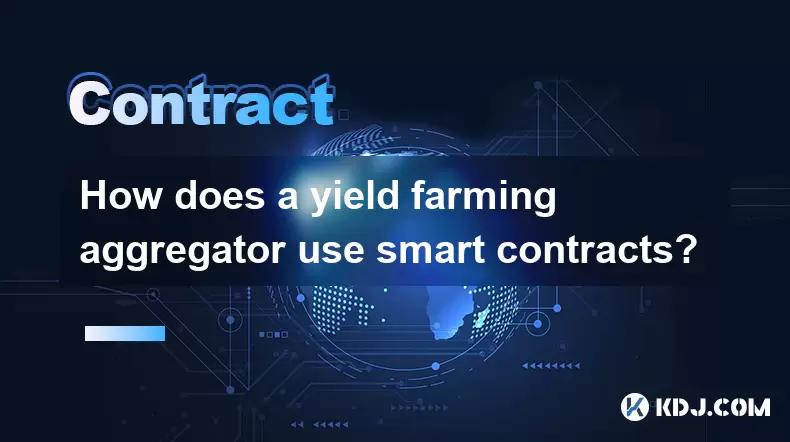
How does a yield farming aggregator use smart contracts?
Jul 11,2025 at 02:49am
Understanding the Role of Smart Contracts in Yield Farming AggregatorsA yield farming aggregator leverages smart contracts to automate and optimize th...
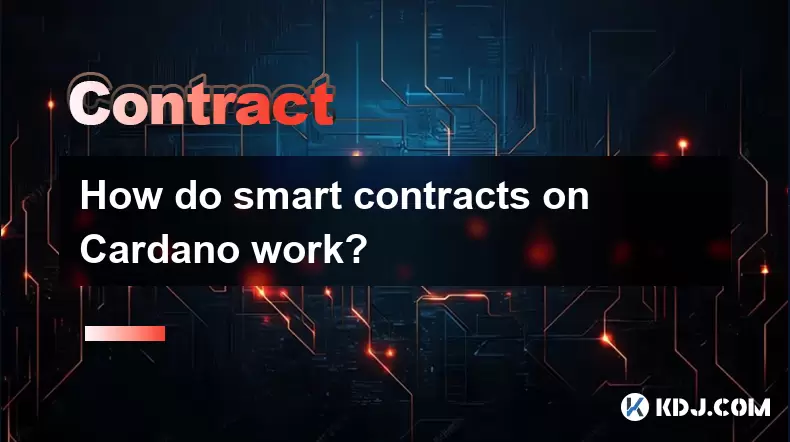
How do smart contracts on Cardano work?
Jul 12,2025 at 10:56am
Understanding Smart Contracts on CardanoSmart contracts are self-executing agreements with the terms directly written into code. On Cardano, a third-g...

What is isolated margin vs cross margin?
Jul 12,2025 at 04:01pm
Understanding Margin in Cryptocurrency TradingIn cryptocurrency trading, margin refers to the amount of funds a trader must deposit to open and mainta...

How to estimate the PnL of a short futures position?
Jul 10,2025 at 05:00pm
Understanding the Basics of Futures Trading and PnLIn futures trading, a trader enters into a contract to buy or sell an asset at a predetermined pric...

What are the most common smart contract design patterns?
Jul 10,2025 at 09:29pm
Introduction to Smart Contract Design PatternsSmart contract design patterns are standardized solutions to recurring problems encountered during the d...

What is a Commit-Reveal scheme in a smart contract?
Jul 10,2025 at 05:22pm
Understanding the Concept of a Commit-Reveal SchemeIn the realm of blockchain and smart contracts, privacy and fairness are often critical concerns, e...

How does a yield farming aggregator use smart contracts?
Jul 11,2025 at 02:49am
Understanding the Role of Smart Contracts in Yield Farming AggregatorsA yield farming aggregator leverages smart contracts to automate and optimize th...

How do smart contracts on Cardano work?
Jul 12,2025 at 10:56am
Understanding Smart Contracts on CardanoSmart contracts are self-executing agreements with the terms directly written into code. On Cardano, a third-g...
See all articles























